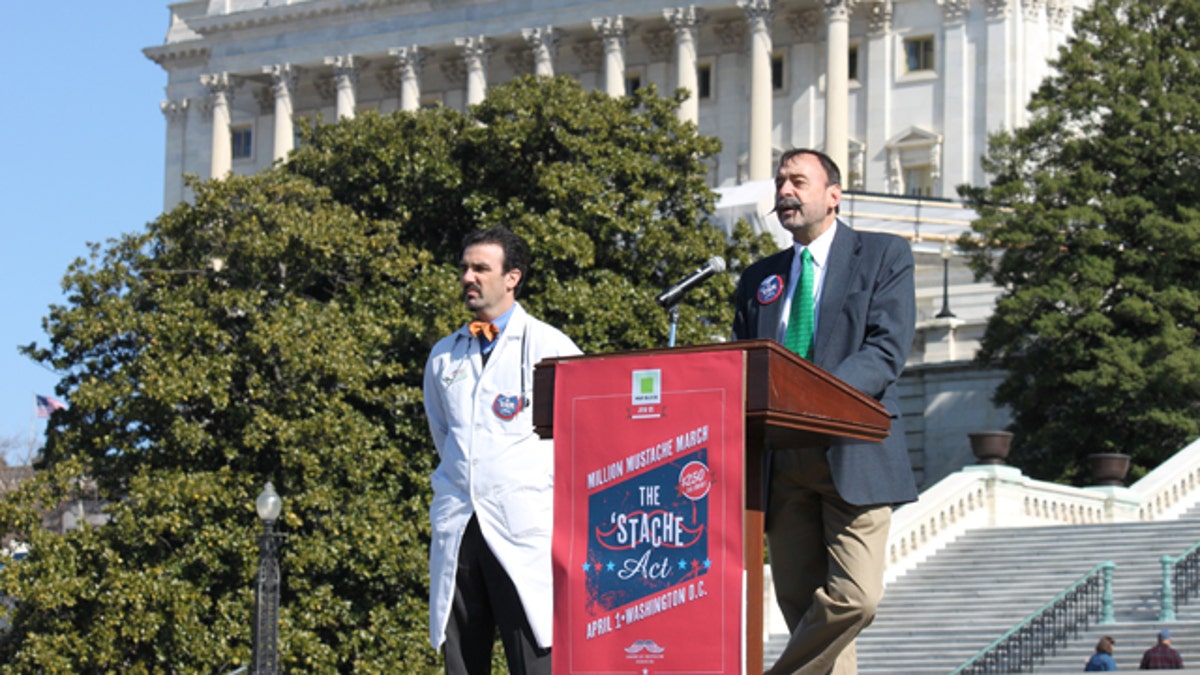
Feb. 20, 2012: Aaron Perlut, left, chairman of the American Mustache Institute, and John Yeutter of Northeastern State University promote a proposal to give a $250 tax refund to mustached Americans. (AMI)
As Congress pays lip service to Americans seeking tax reforms, an underrepresented constituency has a hairy proposition -- getting lawmakers to approve a $250 tax refund for mustached Americans.
Members of the American Mustache Institute traipsed up to Capitol Hill Monday -- while lawmakers were out of town for President's Day -- to seek a tax break for men with facial hair, who (AMI-authored studies show) are 38 percent better-looking than the rest of America.
But demonstrating that the organization is not biased, AMI Chairman Aaron Perlut, who claims to personally spend "somewhere between $1,000 to $1,500" annually on grooming products, said anyone with hair care costs would be eligible for the $250 annual tax refund.
"We have to be fair -- not everybody likes chocolate ice cream and not everybody wants to be 38 percent better-looking," Perlut told FoxNews.com.
Declaring mustached Americans not only more attractive and sexually dynamic (institute studies show), Perlut said follicly enhanced Americans are strong contributors to the economy -- since trimmers, wax and other accoutrements are costly luxuries -- as well as protectors of the environment -- because not shaving saves water.
Putting its money where its mouth is, AMI is planning an April 1 million mustache march from the Capitol to the White House. Adding a sweetener to enhance participation, it has also recruited H&R Block to make donations to Millions From One, which provides clean drinking water to those in need, for every individual who participates in either AMI's Facebook campaign or the march itself.
"We're very serious that Americans should never settle for less when it comes to getting the tax deductions they're entitled to," Scott Gulbransen of H&R Block said in a press release. "That's why we are supporting the American Mustache Institute's 'STACHE Act movement by making charitable contributions to Millions From One for every participant in the campaign.”
"We technically have not have a lot of corporate sponsorship on purpose but in this case we needed some validation for our effort," Perlut said.
The Stimulus to Allow Critical Hair Expense Act, or 'STACHE Act, is the brainchild of John Yeutter, an associate professor of accounting and tax policy at Northeastern State University in Tahlequah, Okla. Yeutter issued a 2010 white paper noting the link "between the growing and maintenance of mustaches and incremental income."
"It appears clear that mustache maintenance costs qualify for and should be considered as a deductible expense related to the production of income under Internal Revenue Code Section 212," Yeutter wrote.
The proposal doesn't yet have a sponsor, though Perlut said AMI is appealing to Rep. Roscoe Bartlett, R-Md., and Sen. John Hoeven, R-N.D., for support. Perlut said the group is particularly interested in Hoeven, the only senator with facial hair (excluding the occasionally bearded Sen. Tom Coburn, R-Okla.), as AMI "actually played a significant role" in supporting his Senate campaign.
Hoeven's office was not immediately available to comment.
AMI suggested that the dearth of mustached lawmakers in both Congress and on the state level may be the reason the country hasn't yet created a tax break for hair grooming products. Perlut said only 34 representatives, "not including Nancy Pelosi" have facial hair while 26 states are "unrepresented by mustached Americans."
But as lawmakers try to trim the budget, the group may have a hard time convincing lawmakers that the break is vital to the intended beneficiaries.
"Studies have indicated that people with facial hair earn more on average than our clean-shaven mortal counterparts," Perlut said. "There is no question that we have a steep hill to climb."




